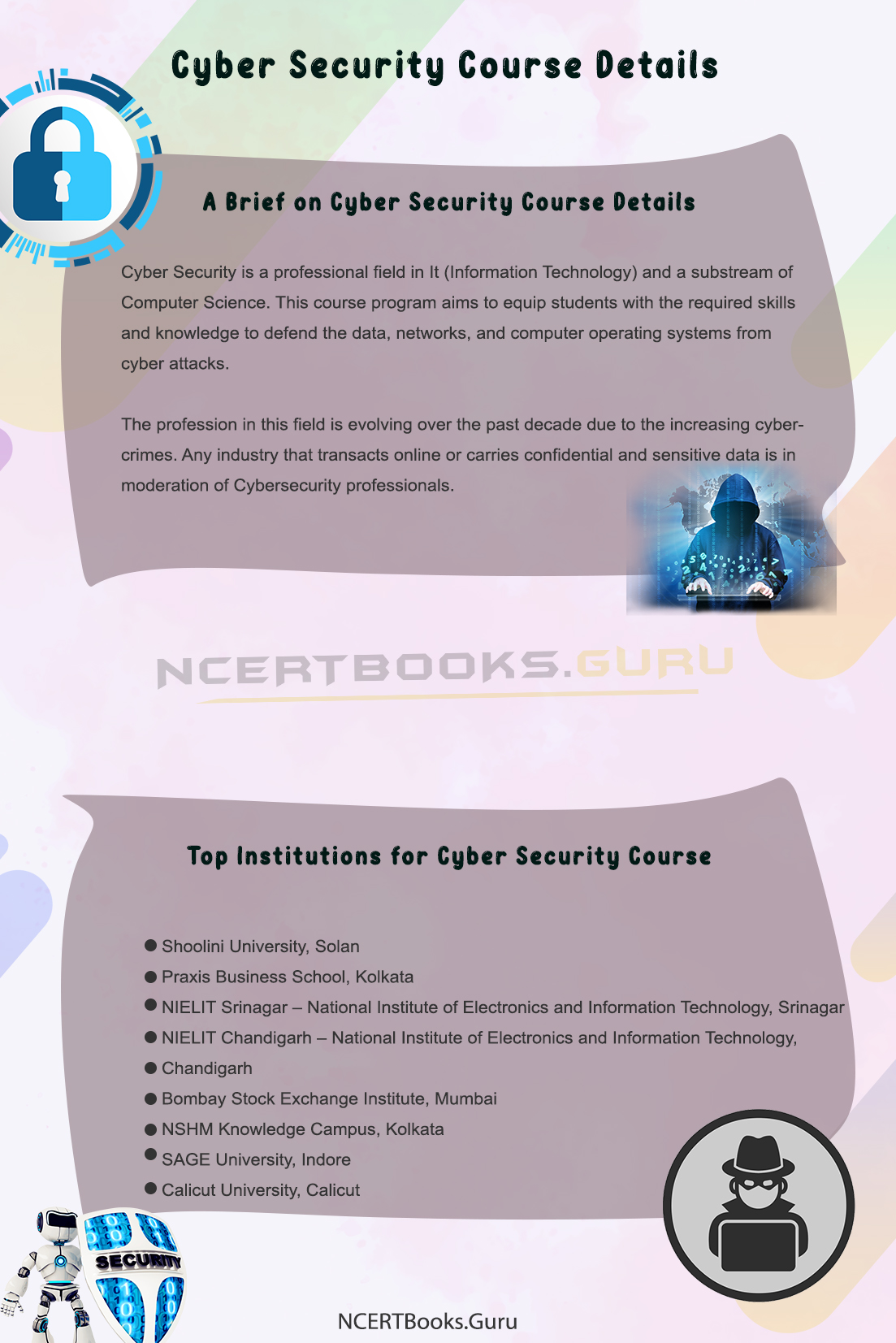Cyber Security Course Details: India battles a 37 percent increase in cyberattacks such as unpatched software, malware, hacking, phishing, identity theft, hijacking files, and many more. To ensure the system’s integrity and confidentiality of sensitive information, Cybersecurity courses introduce the basics of the field.
This article provides you the list of Cyber Security courses as a reference for school or college work. Below are the course program’s recorded structure for aspirants to pursue after twelfth or after graduation. This report covers the overall topics like prospectus, course gradations, particulars on qualification, the confirmation process, fee structure, and vocation possibilities.
Get to Know More about other types of Course Details in Stream wise, and Category wise
- A Brief on Cyber Security Course Details
- Skillset Required for Cyber Security Courses after 12th
- Cyber Security Course Details
- Degree Cyber Security Course Program
- Diploma Cyber Security Course Program
- Cyber Security Certification Course Programs
- Accessible Cyber Security Course Program
- Degree Course Programs
- Certification Course Programs
- Cyber Security Specialisation Programs
- Degree Specialisation Courses
- Certification Specialisation Cyber Security Courses
- Cyber Security Course Eligibility Criteria
- Cyber Security Course Fees
- Entrance Examinations Under Cyber Security Course
- Cyber Security Course Curriculum
- Top Institutions for Cyber Security Course
- Career Prospects of Cyber Security
- Top Recruiters Under Cyber Security
- Salary Prospects of Cyber Security Course Holders
- FAQ’s on Cyber Security Course Details
- Summary of Cyber Security Course Details
A Brief on Cyber Security Course Details
Cyber Security is a professional field in It (Information Technology) and a substream of Computer Science. This course program aims to equip students with the required skills and knowledge to defend the data, networks, and computer operating systems from cyber attacks.
The profession in this field is evolving over the past decade due to the increasing cybercrimes. Any industry that transacts online or carries confidential and sensitive data is in moderation of Cybersecurity professionals.
Cybersecurity courses are prevalent through Degree programs, training, and certification in information technology, information security, and cybersecurity. This course program offers bachelor’s, masters and even certificate level with practices and processes for network protection and data from unauthorized attacks.
Through these different programs, students learn to detect the vulnerabilities of a system, identify security issues, ward off attacks, protect the information, track down the individual who hacked data, and manage emergencies.
Cyberspace is a platform that safeguards data from delinquents and os accessed by anyone from any corner of the globe. Because cybersecurity is necessary, homeland security and various other sectors have incorporated cyberspace as a part of their program. Thus, the scope of cybersecurity is equally yet varied with a different focus across the globe
Some of the essential topics covered in cybersecurity classes include:
- Information management
- Computer systems
- Risk management
- Cyber law and ethics
- Technical report writing
- Investigation techniques
Skillset Required for Cyber Security Courses after 12th
With the evolution of technology, Cybersecurity professionals need to stay updated with the latest advancements to cushion against world cyber threats. Here are the following cybersecurity skills that make you an in-demand expert in the field:
- Cloud Security
- Security Analysis
- Black-Hat thinker
- Programming
- Mitigation and Risk Analysis
- Intrusion Detection
- Reversing and Malware Analysis
Cyber Security Course Details
Candidates are offered with multiple options prospecting their career in Cyber Security. Candidates can opt Degree course programs, Diploma Course programs, Certification course programs, both at UG and PG level.
Cyber Security course programs can be pursued as a full-time course or part-time course or even online. A majority of the Cyber Security course programs are offered as full-time course programs by private and government institutions. However, certification courses are more relevant to prospective students.
Degree Cyber Security Course Program
Students can pursue B. Tech or B. Sc Degree in Cyber Security and Computer Science (CS) after the completion of their higher secondary education.
B. Tech degree course programs in Cyber Security/ Computer Sciences are conducted for four years, and B. Sc in Cyber Security/ Computer Sciences is a three-year-long course duration.
Diploma Cyber Security Course Program
Students are eligible to pursue Diploma courses in Cyber Security programs at both Undergrad and Postgrad levels.
The course duration for both Undergrad and Postgrad Diploma course programs fluctuates between 10 months to 1 year-long duration.
Cyber Security Certification Course Programs
Certification course programs in Cyber Security/Computer Sciences are short-term course programs majorly offered online and some offline.
The entire Computer Sciences/ Cyber Security course duration for can fluctuate between three to six months long.
Accessible Cyber Security Course Program
Here are a few popular Cybersecurity Degree and Certificate courses available in India for interested students:
Degree Course Programs
- B.Tech or M.Tech in Computer Science Engineering with Cyber Security
- B.Tech or M.Tech in Computer Science Engineering with Forensics and Cyber Security
- B.Tech or M.Tech in Computer Science Engineering with Cyber Security and Networking
- B.Tech or M.Tech in Computer Science Engineering with Quick Heal and Cyber Security
- B.Tech or M.Tech in Computer Science Engineering with Certified Cyber Security Investigator
- B.E in Information Technology with IBM
- B.Sc in Cyber Security
- B.Sc in Information Cyber Security and Technology Management
- BCA Hons. In Cyber Security
- BCA with Microsoft Cloud Computing and Cyber Security
Certification Course Programs
- Certified Ethical Hacker course
- Certificate in Information Security course
- Certified Risk and Information System Control course
- ISACA Certified Information Security Management course program
- ISACA Certified Information Security Auditor course program
- ISC Certified Information Systems Security Professional course program
- Cisco Certified Network Professional
- Cisco Certified Information Security Expert
Cyber Security Specialisation Programs
In India, several cybersecurity courses offer various specialization programs. Given below is a list of Cyber Security Specialisation course programs for interested candidates to choose when willing to take up a course in Cyber Security.
Degree Specialisation Courses
- Information Security with IBM
- Information Technology Management and Cyber Security
- Computer Science with Cyber Expert Investigator
- Computer Science with Cyber Security and Quick Heal program
- Computer Science with Networking and Cyber Security
- Computer Science with Cyber Security and Forensics program
Certification Specialisation Cyber Security Courses
- Security Professional
- Information System Auditor
- Information Systems Security Professional
- Information Security Management
- Certified Systems Engineering
- Cyber Expert and Investigator
Cyber Security Course Eligibility Criteria
The eligibility factor varies from across the institutions in India. Each institution holds a different selection process and eligibility factor based on the available course level and type. To pursue a Cyber Security course program at Undergrad and postgrad levels, candidates must meet the essential eligibility criteria.
- Eligibility Criteria for Undergrad Cyber Security Courses: To clear the admission process for any of the undergraduate degree programs in Cyber Security, candidates should have completed higher secondary education (10+2) in the stream of science with a minimum aggregate from a recognized board or equivalent.
- Eligibility Criteria for Postgrad Cyber Security Courses: To be able to clear the admission process in the master’s program, candidates should complete their graduation in Cyber Security with a minimum of 50 percent aggregate in the qualifying examination from a recognized university or institution.
Cyber Security Course Fees
Cyber Security Course Fees structure for different colleges ranges from INR 1,30,000 to 2,00,000.
Entrance Examinations Under Cyber Security Course
Most institutions in India offering Cyber Security courses have a uniques selection process and admission criteria based on the type and levels of courses being offered.
The admission process to the degree courses in Cyber Security is through national level examinations. However, some reputed institutions take admission ob the basis of entrance levels exams such as CET, IIT-JEE, etc.
Some institutions conduct in-house entrance examinations for admission to the diploma courses. Those candidates applying for cybersecurity certifications have no entrance examination of any sort.
Cyber Security Course Curriculum
The course curriculum for Cyber Security varies based on the level and type of courses. However, the generic course curriculum for Cyber Security courses are as follows:
- An Introduction to Cyber Security
- Measuring Cyber Security
- Security Investment and Management
- Market Failures and Policies
- Policy Interventions to Correct Market Failures
- Case Study: Cooperation and information sharing
- The Human Factor
Top Institutions for Cyber Security Course
- Shoolini University, Solan
- Praxis Business School, Kolkata
- NIELIT Srinagar – National Institute of Electronics and Information Technology, Srinagar
- NIELIT Chandigarh – National Institute of Electronics and Information Technology, Chandigarh
- Bombay Stock Exchange Institute, Mumbai
- NSHM Knowledge Campus, Kolkata
- SAGE University, Indore
- Calicut University, Calicut
- Karunya Institute of Technology and Sciences, Tamil Nadu
- Apeejay Institute of Management and Engineering Technical Campus, Jalandhar

Career Prospects of Cyber Security
After the completion of Cybersecurity course programs, graduates can work as Cybersecurity professionals, or information security analysts with a broad spectrum of responsibilities. A graduate’s primary job in this field is to safeguard an organization’s files and network, create security plans, monitor activity, and install firewalls.
Graduates can look forward to work in the following job profiles:
- Cryptographer
- Vulnerability Accessor
- Forensic Expert
- Security Software Developer
- Penetration Testes
- Chief Information Security Officer
- Security Engineer
- Security Architect
- Security Manager
- Security Auditor
- Security Code Auditor
- Security Consultant
- Security Administrator
Top Recruiters Under Cyber Security
Graduates from Cybersecurity courses get recruited incorporates and MNCs such as:
- Banks
- Apple
- Patient First
- Lockheed Martin
- General Motors
- Capital One
- Cisco
- Intel
- Northrop Grumman
- Boeing
Salary Prospects of Cyber Security Course Holders
The average salary for a cybersecurity a fresh graduate is around INR 7 lakhs per annum. However, with time and experience, the pay package increases. Experienced resources are in more demand, drawing salaries in the range of INR 20 lakhs to INR 24 lakhs per annum.
FAQ’s on Cyber Security Course Details
Question 1.
What scope do the Cybersecurity courses offered in India?
Answer:
India has turned into a breeding ground for Cyber Security experts. In India, the scope of Cyber Security has turned to a more competitive platform. The average salary for a cybersecurity a fresh graduate is around INR 7 lakhs per annum. However, with time and experience, the pay package increases. Experienced resources are in more demand, drawing salaries in the range of INR 20 lakhs to INR 24 lakhs per annum.
Question 2.
What are the different course categories offered For Cybersecurity courses?
Answer:
Candidates are offered with multiple options prospecting their career in Cyber Security. Candidates can opt Degree course programs, Diploma Course programs, Certification course programs, both at UG and PG level.
Question 3.
What is the eligibility factor for a candidate to apply for Cybersecurity courses?
Answer:
The eligibility criteria differ for course type and level. However, the standard criteria to be met by applicants are:
- For undergraduate degree programs in Cyber Security, candidates should have completed higher secondary education (10+2) in the stream of science with a minimum aggregate from a recognized board or equivalent.
- For the master’s program, candidates should complete their graduation in Cyber Security with a minimum of 50 percent aggregate in the qualifying examination from a recognized university or institution.
Summary of Cyber Security Course Details
We hope that the information mentioned above regardingCyber Security Course Details has helped improve your understanding of the subject with in-depth knowledge.
